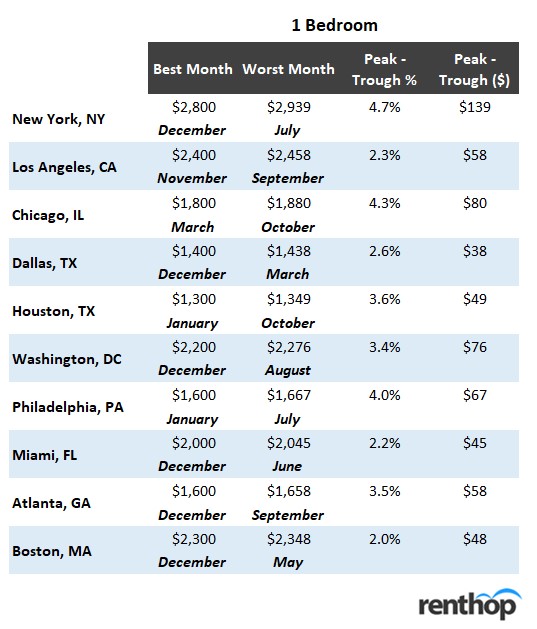I’m going to show you exactly how to negotiate your rent so you can put a couple thousand dollars — or more — in your pocket this year.
Most people don’t think negotiating their rent can save them much money — or that it’s even possible! But look at the results for two of my students:
“When I went to ask for a rent reduction, the office kept on insisting that I was already paying ‘market rate.’ I let them know that I was serious on leaving if they didn’t give me a lower rate … They agreed to give me a rate of $1,435 which is $150 off my previous rent! With a 12-month lease, that is a savings of $1800!” – Sharon C.
“My lease renewal was coming up and the rates around where I live were going up at a phenomenal rate too … I wanted to stay at a lower apartment fee or the same. Initially, the leasing office turned down my request. However, when I mentioned that I’d be willing to sign a lease for 12 months — they went ahead and reduced my rent by $200 a month. The year has barely started and thanks to you I was able to save $2400 for this year!” – Sophia
Your rent is NOT fixed and beyond negotiation. You can lower your rent … if you know how to negotiate. The key is going into a negotiation with the right mindsets and preparation.
How to negotiate rent (with 5 rules)
Negotiating rent is not about stomping your foot down and demanding what you want in a very confrontational way. True negotiation isn’t adversarial at all. In fact, the best negotiation comes from finding a true middle ground.
Rent negotiation starts by clearly understanding both people’s intentions and positioning your offer in a way that clearly benefits you and the other side.
I want to walk you through the five rules on how to negotiate rent that’ll dramatically increase your chances of saving money. They are:
Let’s jump in.
How To Negotiate Rent Rule #1: Know what you want

If you walk into a rental negotiation without a number — the rent you want — you’re at the mercy of a landlord. It’s your landlord’s job to determine how much money to charge you each month in order to maximize their profits.
That’s why you need to know the exact number you want out of the rent negotiations. This number is going to vary from person to person, and will depend a lot on where you live. After all, a person living in San Francisco will want a different number than someone in Fargo, North Dakota.
To help you find a good percentage, head to Zillow or Craigslist. Compare the average price for an apartment your size in your city and neighborhood to your apartment. This will help you determine a solid rent reduction percentage.
Even if you lower your monthly rent by just $50 / month, that’s a savings of $600 / year! A big win and completely achievable goal.
Other things you can negotiate for:
Negotiating rent doesn’t just have to include how much you’re paying your landlord in cash. You can include other things, such as:
- Free parking
- Free storage unit / garage
- Free or partially paid utilities
- Guest parking passes
- Security deposit
- Waived pet fees
Even if you can’t get the exact rent you want, you can still negotiate for these other features and save money.
When you know what you want, not only can you communicate that crisply to your landlord, you can demonstrate WHY they should accept your terms.
How To Negotiate Rent Rule #2: Offer something in return
Of course, you can’t just say, “I want to take $200 per month off my rent!” You have to be ready to offer something in return.
What does your landlord really want? Money, of course. But dig deeper and you’ll find there’s a lot more you can offer. The goal is to give them something you don’t care about in exchange for something you do.
Here are a few things many landlords will happily lower rents for:
- Prepay months in advance
- Sign an extended lease
- Offer to extend the termination notice from 30 days to 60 or 90 days
- Offer to give up your parking space if you don’t have a car (the landlord could charge another tenant for an extra space)
- Promise not to smoke in the apartment (this will save the landlord money when you move out)
- Promise not to keep cats even if they’re allowed (another cleaning expense for the landlord)
- Make a deal for referrals if they have low occupancy
If you know what you want and you know what they want, the chances of succeeding in your negotiation increase significantly.
How To Negotiate Rent Rule #3: Know the market and when to negotiate
Timing matters when it comes to negotiating your rent.
Like any other commodity, apartments go through feast and famine periods. There are times when it’s a buyer’s market and the landlord has a lot of empty units they need to rent. Then there are periods where they have renters literally knocking down their door to get apartments.
And knowing when to negotiate your rent is crucial to getting your landlord to agree to a lower rate. If you’re negotiating a current lease, I recommend negotiating 2 – 3 months before your lease expires.
Remember: Your landlord is looking out for their bottom line. The average cost of tenant turnover is anywhere between $1,000 and $5,000! That’s why your landlord would rather keep you on as a tenant than have to spend the time and money trying to find someone to fill the unit.
As it gets closer to your lease expiring, they’re going to want to do what they can to keep you on as a tenant. That’s why it’s a perfect time to negotiate your current rent.
If you’re negotiating on a new lease, the best time to do it is during the winter months. This is a time that’s notoriously difficult for landlords to fill units (probably because moving sucks enough without having to deal with snow and ice).
A recent study from RentHop, a popular apartment listing site, discovered that you can save hundreds of dollars a year based on when you negotiate. Check out their chart below for more on the best times to negotiate rent:
 Source: RentHop
Source: RentHopThe worst time to be negotiating would be in the summer and early fall. Good times to avoid finding apartments if you can help it.
How To Negotiate Rent Rule #4: Have the right script
When it comes time for negotiations, it’s fairly simple. Simply speak with your landlord (ideally in person), remind them that you’re a good renter, and ask them for lower rent. The key with any negotiation is to be polite, but firm in your request.
Here’s a sample script you can follow:
YOU: Hey [LANDLORD’S NAME]. I’d like to lower my rent by $200.
LANDLORD: Uh, I don’t think I can do that because [insert some BS about the market and how they can’t lower prices].
YOU: I compared the rent of similar apartments in this neighborhood and they’re all 10% less than what you charge me. I’ve been a good renter and have always been on time with my payments for the past year. I’d hate to not renew my lease because of the rent — but am willing to. What can you do for me?
If your landlord agrees, then congrats! You just lowered your rent for the year.
Your landlord might be firm about not being able to change the rent though. If that happens, ask if there are any concessions they can make with deals like in rule #1.
And remember: Sometimes you’re going to get shut down by whomever it is you’re negotiating with — that’s why you need to prepare the Door-in-the-Face technique.
Imagine there’s a nonprofit worker soliciting donations to a homeowner.
Nonprofit worker: “Hi, would you like to donate $50 to the Save The Whale Foundation?”
Homeowner: “Hell no.”
Nonprofit worker: “Okay, how about $5?”
Homeowner: “Hmm okay, sure.”
See what the nonprofit worker did? He knew he wasn’t ever going to get $50 — but he also knew that if he gave a drastically reduced amount after his initial ask, the homeowner would be much more susceptible to donating.
It doesn’t matter if you’re negotiating your salary or for a lower price on that new car — leverage this technique when you can.
If you’re negotiating, odds are you’ll fail — but that’s totally fine. You should EXPECT failure. Embrace it. And plan accordingly by turning “failure expectation” into domination.
How To Negotiate Rent Rule #5: Practice in low-stakes environments
Most people will lose tens of thousands of dollars over their lifetimes due to their failure to practice upcoming rent negotiations. Actually, most people won’t negotiate rent at all. But even the people who negotiate rarely practice.
They’ll say things like, “It feels weird.” Well, duh. That’s why you’re practicing.
As I always say: Don’t shoot your first basket in the NBA. After all, if you don’t practice, you’ll be going into negotiations cold with a hiring manager whose job is to negotiate all day.
So find a friend or family member to run through tactics with. You can even go to your local farmers market and haggle for small items or try negotiating on Craigslist. Every little bit helps.
Then again, if you don’t practice, why would you expect to convince someone whose likely intent is on keeping your rent exactly where it is, if not raising it?
So grab a friend or a coworker and do a role play. No need to worry about whether it feels awkward or not. Would it feel awkward to save thousands of dollars?
Frequently Asked Questions About How To Negotiate Rent
How do you politely negotiate rent?
- Ask the landlord if rent price is open to discussion
- Offer something of value in return
- Know what you want before approaching your landlord
- Offer your landlord something in return
- Know when to negotiate (timing is important)
- Use a script to make the process easier (I provide one below)
- Practice in low-stakes environments
- Research the property’s value
- Negotiate directly, follow up in writing.
Is negotiating rent normal?
Negotiating your rent is more common than you think. A lot of current renters who are looking to renew their lease are in the position of most leverage. Landlords would rather avoid having an empty rent than negotiating for a lower price.
When should you negotiate rent?
Ideally you’ll want to start your rent negotiation conversation early. Three months before your lease expires is about the right time to ask about if the rent will be going up or not. This will give you plenty of time to negotiate and take away the risk of losing your current apartment.

